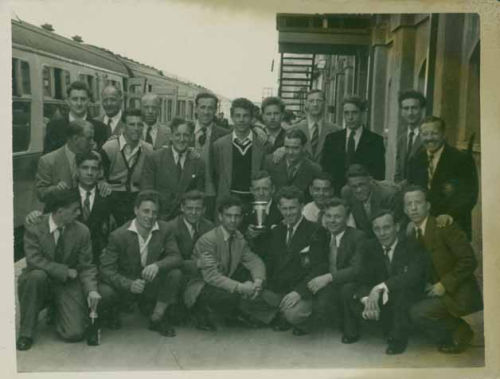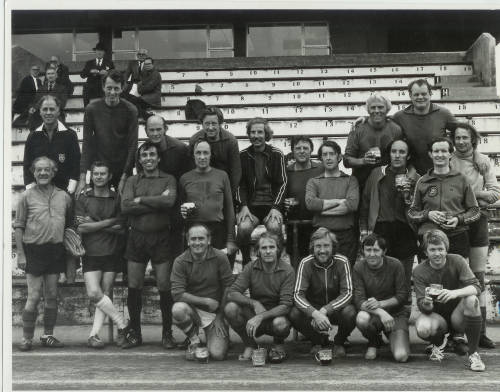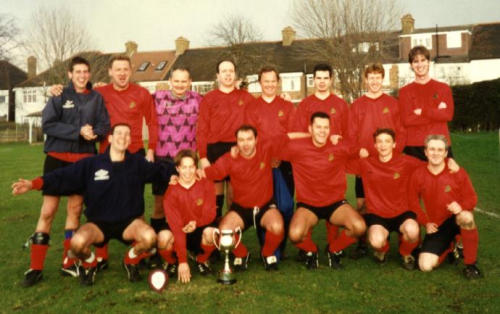History Main Page
19th Century & Pre-War : Inter-War : Post-War
Record Results : Timeline : Honours & FA Cup Results : FA Cup
AFA Cup Results : Ground : Other Sports & Clubs : Harriers Athletic Club
Quintin Hogg : Arthur Kinnaird
Post-war: Joining the SAL
In 1945-46 the Spartan League was revived; to reduce travel expenses, the league was split up into regional divisions, with the Polytechnic seconded to the western division. Other leagues, such as the Middlesex Senior League, also started back up.
The club reverted to its pre-war constitution during that season, with a new management committee appointed. Quintin Hogg MP, the son of the club’s founder, was awarded the presidency in succession to the late Sir Kynaston Studd. He had played for the football club in his boyhood.
In order to attract more supporters to Chiswick, an agreement to share the Stadium pitch with the famous Corinthian Casuals was fostered – this lasted for four seasons until they uprooted to Cheshunt.
After a sixth-place finish, the previous format was restored for 1946-47, with the Poly featuring in the division one western, below the premier division. Several mid-table placings were secured in the following years.

A Poly touring party on their way to Belgium (year unknown)
By 1950 the hoops had been replaced by red and green halves and there were five regular teams. The second XI made it to the premier division of the Nemean League while the ‘A’ team also won a division in that league; the other teams were named ‘B’ and ‘C’.
It was around this time that Eddie Galvin, who served as club secretary for 50 years from 1942, began to record the fortunes of the Poly for presentation at the end-of-season committee gatherings. After his death Galvin bequeathed £10,000 to the club which is still held as the Eddie Galvin fund with the interest helping to meet costs.
One of his first pleasured was to report upon a season in 1951-52 when the first team lost only one league game throughout, scoring 95 goals in 30 games. That loss came at Ware (2-1), who took the title by a single point and gained revenge for our FA Cup win in 1948; however promotion was secured to the premier division of the Spartan League behind them.
By coincidence, only one season after we had bade them farewell from Chiswick, the Poly came up against Corinthian Casuals in the London Senior Cup in that same season. Despite losing the first-round match 1-0, the team did the club proud on its return to the Kennington Oval 59 years after the last appearance there – captain S White-Robinson even missing a penalty.
In that first year back in the top flight, with Bernard Studd now president, the contrast in fortunes between Ware and ourselves was huge: while they romped to the title by three points, losing only two matches, the Poly finished bottom, having lost 20. Ware averaged a crowd of 1,000 at their Buryfield ground that season.
Polytechnic’s endeavours in 1953-54 were to prove the final campaign in a Spartan set-up which would soon be reduced to one senior and one reserve division as town clubs left in numbers for other leagues. A mid-table division one finish was an inauspicious way in which to bring an era to an end.
There are official Spartan League notes that describe an unusual incident during the Challenge Cup that season. Polytechnic were beating Chelsea Mariners when we were awarded a penalty with 10 minutes remaining. Two opposition players were sent off as a result of the subsequent fracas and the rest refused to continue.
Tales of fairness and honour from times bygone seem to fade with this insight; a reminder that our fathers and grandfathers were as human – or flawed – as we sometimes are when faced with emotional moments in our amateur endeavours. The match was awarded to the Poly at a later league meeting.
Also comforting are the records of the clubs accounts kept in ledgers from the fifties onwards. Anyone familiar with the day-to-day running of a club the size of the Poly will recognise the entries: referee fees, raffle tickets, FA and AMA subscriptions, purchase of footballs; sweepstakes, dance and social tickets, a donation to cancer research (£20 in 1968) and the less familiar credit of gate money.
Many present Polytechnic players have enjoyed the benefit of England tickets and such procured through the club and allocated via a draw. There are records of tickets obtained for FA Cup finals, 1966 World Cup matches and the famous 1968 European Cup final at Wembley when Manchester United won the trophy for the first time against Benfica.
The reason for the Spartan League pullout was to reduce travelling expenses, with the London-based Southern Amateur League the destination. It was a move also considered before the Second World War: a 1938 special meeting was called with members voting overwhelmingly to apply.
However at a follow-up meeting the decision was repealed as few of the voters apparently realised it would mean leaving the Spartan League.
The move was considered an acceptable drop in grade which would bring an end to gate receipts. However they had been flagging compared to some of our rivals, while many of them were leaving anyway for the newly-formed Hellenic League, among others.
The move brought about a successful period for the Polytechnic. The club reached the final of the AFA Senior Cup in 1955 and won its first divisional title at the top level in 1955-56, the SAL division three – where we had been required to begin.
The next season the first team finished fourth in division two, but such was the closeness of the table could have won the title on the last day of the season. Only two points separated the top four teams after that final encounter.
Two years later promotion to the SAL top flight was achieved with the second division championship, while a year before the second team had reached the top division in their section.
Many years before the matter of alcohol in the clubhouse had been raised at committee meetings: for decades it had not been available for purchase, meaning players would depart Chiswick soon after a game to find an alehouse. By this time booze was readily available, but there was a new complaint: the Lord Chancellor’s budget had reduced the tax on beer – but it had not been replicated at the clubhouse bar! This was rectified after the matter was brought up at a committee meeting.
That good news, and triumph in the Banks Cup – while most teams were entered in the SAL, there was one in the Banks League – balanced the 1959-60 relegation of the first XI back to the second tier. The Banks Cup was retained the following season.
In 1962 the first team won promotion again on the final day, now with Eddie Bray as captain. In 1962-63 the season was discontinued due to a prolonged spell of freak bad weather.
Relegation in ’65 was to signal the end of the Poly’s participation in the top division of the senior section until 1996 – the ‘30 years of hurt’ of the England national team, sung about by Baddiel and Skinner, mirrored at Chiswick.
Speaking of the 1966 World Cup triumph, that year the club received a replica of the Jules Rimet trophy sent by the FA to all affiliated clubs.
In those decades there were of course many titles, promotions and relegations shared among the growing number of teams, with seven XIs by 1970, eight by ’80 and nine by ’92. While the flagship team struggled, finishing bottom of division two twice in the seventies to spend time in the third tier, the strength in depth at the club was evidenced by the triumphs lower down – for example the three successive division one titles won by the sixth XI in the sixties.
John Keane was a part of that sixth team when they again won their section in the early seventies. Two seasons later, in 1974-75, came perhaps the most successful overall in the club’s history: the second XI, who like the first team had underperformed, won promotion to the second division, while there were two further promotions for the threes and fours and two section titles for the fives and sixes.
That fourth team promotion, led by Peter Jackson, included a 100 per cent win record – until the final day of the season.
Of course the club is about much more than success. The Strollers team, including life servant Harvey Haynes – still captaining the competitive Banks team in the seventies at the age of fifty-plus – for years enjoyed end-of-season tours in Weston-Super-Mare. Their regular matches against the Somerset and Avon Police were also held at Chiswick, with the opposition visiting London once a season. The Netherlands remained a favoured destination for touring among the first XI, while there were tours to Paris, Portugal, Barcelona, Prague and Rome, among many others, from the sixties to the seventies.
Les Parsons, a familiar figure around the club since joining in 1947, became chairman in 1976 and would remain so until 2001, the time of his death. After that sad day for the Poly many tributes poured in for him from other clubs, leagues and governing bodies.
As Harvey would later recall, on one such tour to the West Country Les was accused of wetting the bed by his team-mates after a water leak – as a token of the regrettable incident they bought him a chamber pot, christened Parsons’ Po, and signed it so he would remember his tormentors.
1975-76 was an important time for the Polytechnic: it was the centenary year. The first XI responded with promotion to the second tier but the three teams below them all went back down to their respective division threes. Incredibly Midland Bank, now known as HSBC of course, won all seven of the sections that season.

Poly Vets 1976 (Sir Stanley Rous in trilby hat towards top left)

Poly Vets 1976 (Sir Stanley Rous in trilby hat towards top left)
The above picture was taken in 1976 when a Polytechnic Vets XI, skippered by Peter Jackson, played an AFA Select XI as part of the centenary celebrations. The game was attended by Sir Stanley Rous, Honorary President of FIFA. He can be seen in the trilby hat towards the top left of the picture. John Keane is pictured on the right of the middle row.
The next year the fist team met Midland Bank in the final of the London Banks Challenge Cup. The Bank won to complete a double alongside the AFA Senior Cup.
Arising consistently among the lesser successes was the name Norman Dugdale. That season he had captained the fourth team to promotion and immediately repeated the success in charge of the threes a year later. He did not stop there, winning a divisional title as the third XI went straight up again the following season.
The first team, having missed out on promotion by an agonising point that year, were relegated in 1979-80; but the second team went up to division two and Jackson celebrated his final season in competitive football by taking the sixes up also.
By drawing the final match of the 1980-81 campaign, the top team missed out on the third division championship but were promoted nevertheless. A Colts XI had been set up for younger players which would feed into the top sides: they began by winning their Banks division without losing a game. Half of the club’s sides won promotion that year.
By 1981 the success lower down meant that six of the eight teams we put out each week were competing in their top division – the exceptions being the main and reserve sides. However the first team brought honour to the club with victory in the Banks Challenge Cup over Lensbury in 1982-83, their first cup triumph.
By 1986 every side except the firsts were featuring in their top flight, with every one of them finishing mid-table in 1987. There were AFA cup triumphs for the fives and fours in that decade – the fourth team coming from two goals down to win 3-2 in ’87.
In the mid-eighties the club considered letting out the stadium to rugby clubs to bring in some much-needed cash, with Fulham Rugby League Club and Rosslyn RFC interested; however the latter’s approach “amounted to virtually a takeover bid”, according to club documents, and they were repelled.
After terrible events at the FA Cup semi-final between Liverpool and Nottingham Forest left 95 people – later to rise to 96 – people dead, Polytechnic donated £50 to the Hillsborough Disaster Appeal Fund, a contribution acknowledged by Liverpool chairman John Smith.
That graciousness was reflected in the award of the Hamilton Trophy the following year for the best hospitality and sportsmanship in the league, based upon referees’ reports throughout the season. Keane, known to almost everyone in the club today, was instrumental in that, taking the meeting and greeting duties and making over £1,200 in raffles for the coffers.
There was success on the field of play also, the first team winning another cup – the AFA Middlesex Senior Cup against Mill Hill Village FC.
Parsons reported the sad news of the death of vice-president Mr F Dolman, who had put in 70 years of service to the Poly Cricket Club and 67 to the Poly FC. There were other faithful servants who passed away too towards the end of the century.
Galvin had completed his half-century of service as secretary but, having undergone a serious operation, Parsons took over the recording duties of the various teams’ fortunes.
So soon after the club was acclaimed as sportsmanlike came, as recorded by Les, the “worst disciplinary record in 118 years of history” during the 1992-93 season.
The year before the first XI finally won promotion back to the top division, the second team won their section, as did the fives. For four years all of the top eight sides except the ones had contested their respective top flights (the ninth XI played lower down in the eighth section as there was not a ninth set of tables).
The 1995-96 campaign was emotional, and not just because we returned to the top division in the senior section. Barry Gibbs was the man who led the team there in his last season with them; then there was the death of Eddie Galvin, who had maintained contact with members in the armed forces during World War II and been a member since 1933.
The Poly were also crowned champions of the fourth section – completing a double with the Senior Novets Cup – while three other sides were runners-up in their own division one tables and the sixes won the SAL Cup.

Sixth XI Winners of Inter-Novets Cup 1995/96
Back row (l to r): Simon Gilding, John Vaygelt, Kevin Donnelly, Ian Tapper, Paddy Rumley, Paul Stafford, Jamie Farrar, Andrew Nunn
Front row (l to r): Graham King, Jamie De Havilland, Kevin Davidson, Steve (?????), Will Hitchcock, Peter Bamforth
In the first season back, the firsts finished fourth under Ian McKeand and had been top at Christmas. It was the first year that we had fielded a team in the top division of every section – now reduced to seven – with the fours finishing second to narrowly miss out on retaining their title.
There were several cup wins in the following two years but the most impressive feat was the second-place finish of the first team in division one under L Ewing in 2000.
In 2000-01 the first team won the AFA Middlesex Senior Cup and finished fourth in the table. The reserve side won their division two by four points the following year while the sevens won the Junior Novets Cup.
After the sad passing of Les Parsons, John Keane was appointed as chairman.
The seconds went on to take the championship of the reserve section, again by four points, the following season, while the first XI again won the AFA Middlesex Senior Cup.
The sections were altered in 2004-05, incorporating the lower sections within a regional structure and only the top three teams competing in London-wide leagues. The threes finished third in the top flight of the newly-named junior section.
The first team were relegated that season. After a year’s hiatus they returned as champions under Jeremy Seales while winning the cup again, showing the strength of the club in the last few decades.
The second team made it into the top division of the reserve section – now known as the intermediate section – in 2007-08 as Jon Pybus took over, while Rob Sullivan won the manager of the year award as his men secured their title on a double-header final day. The threes, led by Keith Johnston, lost their cup final after goalkeeper Neil Howard was carried off with knee ligament damage.
With Keane taking a sabbatical after many years of service to the Polytechnic, long-time servant Sean Harney was appointed chairman.
